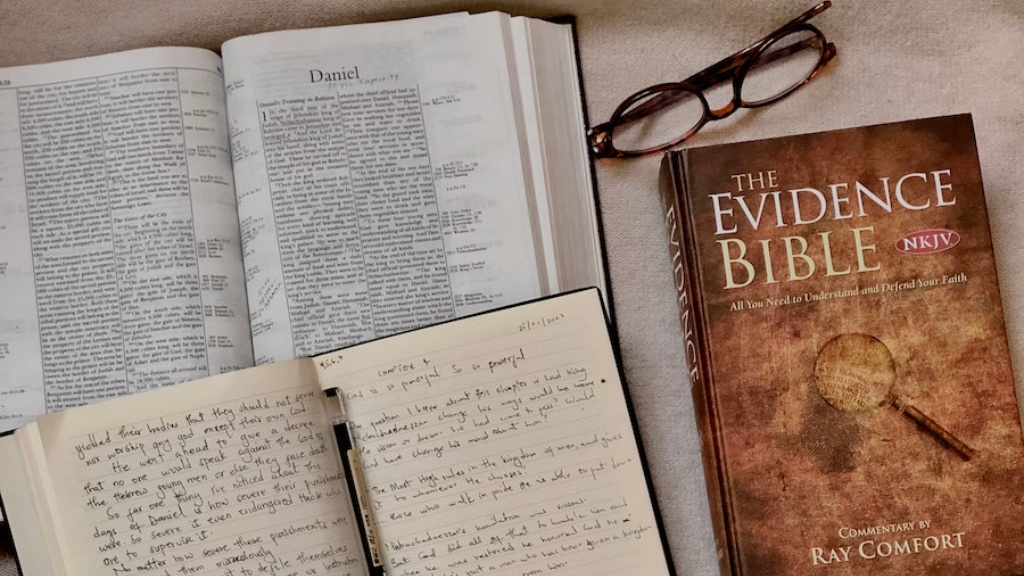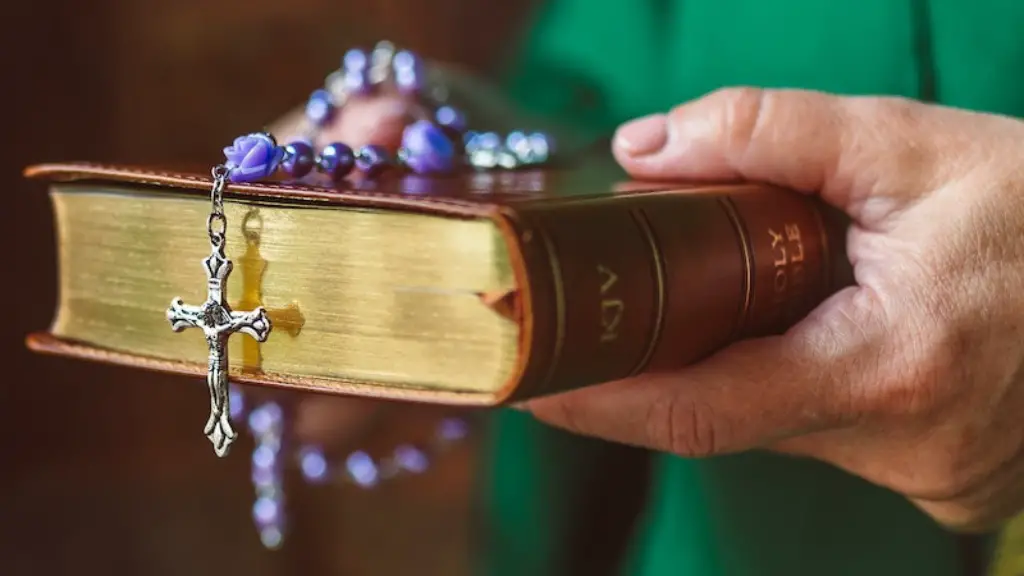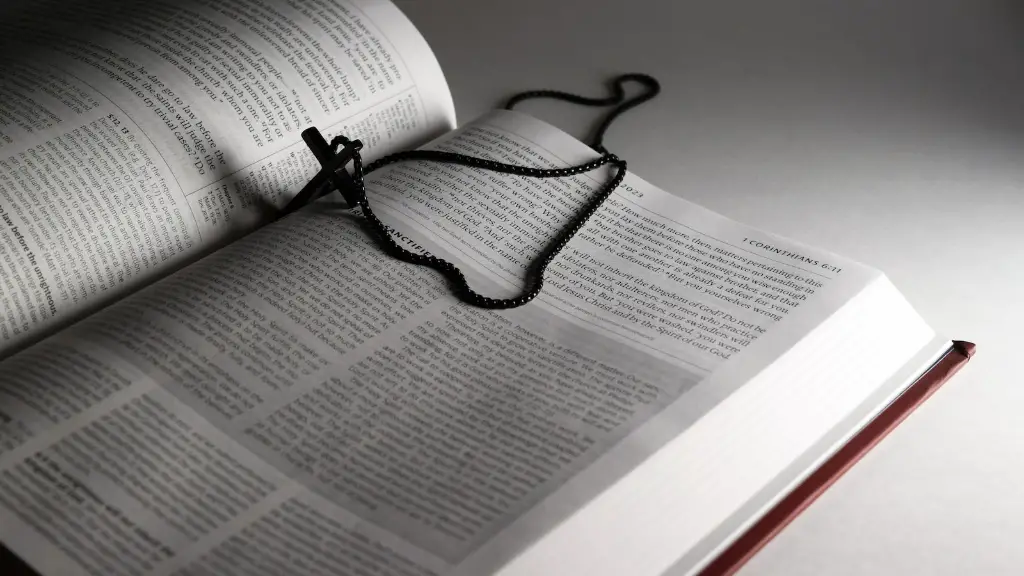Noah’s Ark, mentioned in the Bible several times, is a significant part of Judeo-Christian religions. In the Bible, Noah builds the ark and loads it with seven pairs of clean animals and one pair of unclean, as well as his family, and survives the great flood. It is important to consider why the story of Noah’s ark is present in the Bible, and to gain an understanding of the impact that it has had on religious history and practices.
In Genesis 6, God sees the wickedness of humanity and decides to send a great flood to wipe out almost all living things. To save himself and his family, God instructs Noah to build an ark and load it with animals.
The Hebrew words for ark, teba, charta, and taviya all have their root in a word meaning “to cover.” In the text, Noah’s ark is described as a rectangular vessel made out of gopher wood, with three decks and a covering of pitch inside and out. The ark also contained seven pairs of clean animals, and one pair of unclean animals. This number was probably chosen because it is considered a “perfect number” according to ancient and medieval ideologies.
Some experts suggest that the inclusion of Noah’s ark in the Bible is meant to show that God is a compassionate and powerful being. Through the story of the flood, God is shown to be both merciful and just, as he is willing to save the righteous, but unwilling to tolerate the sinfulness of humanity.
The story of Noah’s ark has been depicted in many forms throughout history, including literature, art, and film. It is also mentioned in other religious texts such as the Quran, highlighting the significance of the ark in global culture.
The importance of Noah’s ark is subject to interpretation, as different people and cultures may view the story in different ways. For some, the story is taken literally, and the ark is seen as a tangible representation of God’s promise to protect humanity. For others, the ark is a symbol for hope and the power of faith and devotion.
No matter the interpretation, the story of Noah’s ark is a powerful one and is sure to remain relevant in the Bible for many years to come.
The Aftermath of the Flood
Once the flood had receded, God made a covenant with Noah, promising that he would never again use a flood to punish humanity. This covenant was often referred to in literature and art, as a symbol of God’s faithfulness to his word.
As Noah and his family left the ark, they were met with a new landscape, as much of the surface of the earth had been destroyed by the floods. The relatively barren landscape meant that the survivors of the flood had to start anew, but could take comfort in knowing that they had been saved by God.
The story of Noah’s ark is often recounted in religious services, as a reminder of God’s power and love. For many, the story teaches the importance of faith and obedience, while prompting reflection on one’s own relationship with God. Despite the destructive nature of the flood, the overwhelming presence of God is ultimately seen as a source of strength.
The story of Noah’s Ark is also often seen as a source of hope in moments of despair, as it serves as a reminder that God is always in control, and will not leave his people in times of need.
The Significance of Noah’s Ark in Today’s Society
In some ways, the story of Noah’s Ark still holds relevance in today’s society, as it serves as a reminder that God’s power is still at work in the world.
In the modern world, there is a temptation to rely on technology and science in our everyday lives, but the story of the flood encourages us to remember God’s faithfulness, and the need to seek him out in all circumstances.
The story also offers a reminder of the importance of faith, courage, and trust in God. In moments of difficulty and strife, it can be easy to forget the power and comfort that comes from trusting God’s plans.
In times of joy and success, the story encourages us to remember that these blessings are from God and to be grateful for all that he has provided.
Noah’s Ark in Historical and Cultural Context
The story of Noah’s Ark most likely originated in an ancient Mesopotamian flood story, as accounts of a great flood can be found in various other cultures.
The Old Testament account was likely shaped and adapted for a Jewish audience, as evidenced by the frequent references to God’s covenant with Israel and the story’s ultimate focus on the covenant’s permanence.
In some cultures, the story even served as a moral lesson, reminding listeners and readers that evil must be punished and that God will always keep his word.
The Setting of the Story
The story, as related in the Bible, states that the flood occurred “in the six hundredth year of Noah’s life.” The setting of the story, however, is likely not meant to be taken literally.
Instead, the narrative may be intended to evoke a time of moral decline and wickedness in humanity, and the need for divine intervention and punishment.
The story of the flood serves as a reminder to look inward and reflect on one’s own values and actions. It also serves as a reminder that even in times of moral decline, God is still in control and will never leave his people.
Legacy of the Story
Noah’s ark is remembered in cultures around the world, providing an opportunity for reflection on the power of God and how his mercy and justice prevails in all circumstances.
From art and literature to religion and film, Noah’s ark has left a lasting legacy, as its story continues to move and challenge people from all walks of life.
The story of Noah’s ark speaks to a fundamental truth: in life, we must choose to trust in God, obey his commands, and show faith and courage even in the darkest of times.
The Role of Faith
For many, faith is the ultimate test in regards to the story of Noah’s ark. God instructed Noah to build an ark, despite not knowing when or if the flood would come. This shows the power of faith, and the importance of being obedient to God even when things may seem unclear.
For those who read the Bible, the story of Noah’s ark serves as a reminder of the power of faith and how we can trust God even in times of uncertainty. Today, Noah’s ark continues to provide a powerful narrative of redemption and a reminder of God’s ultimate mercy.
Connection to Nature
The story of Noah’s ark also serves as a reminder of our connection to nature and the environment. As the flood destroyed much of the earth, God instructed Noah to take animals on the ark as a means of preserving life. This serves as a reminder of the importance of caring for the natural world and keeping plants and animals safe.
Noah’s ark is a reminder of the power of nature, and of the importance of showing mercy and care to all living things. It also serves to illustrate God’s faithfulness and his commitment to preserving life even in the darkest of times.
Relevance of the Ark
Noah’s ark has considerable relevance today in terms of environmental protection, as it reminds us of the importance of protecting God’s creation. It is also a reminder of the power of faith in difficult times, and the importance of being obedient to God even when the circumstances may not seem ideal.
The story of Noah’s ark continues to be of great importance in Biblical and religious studies, as it is a profound example of how God cares for and protects his people. The story also serves as a reminder that, even in times of uncertainty and destruction, God’s power prevails and he will always keep his promises.





